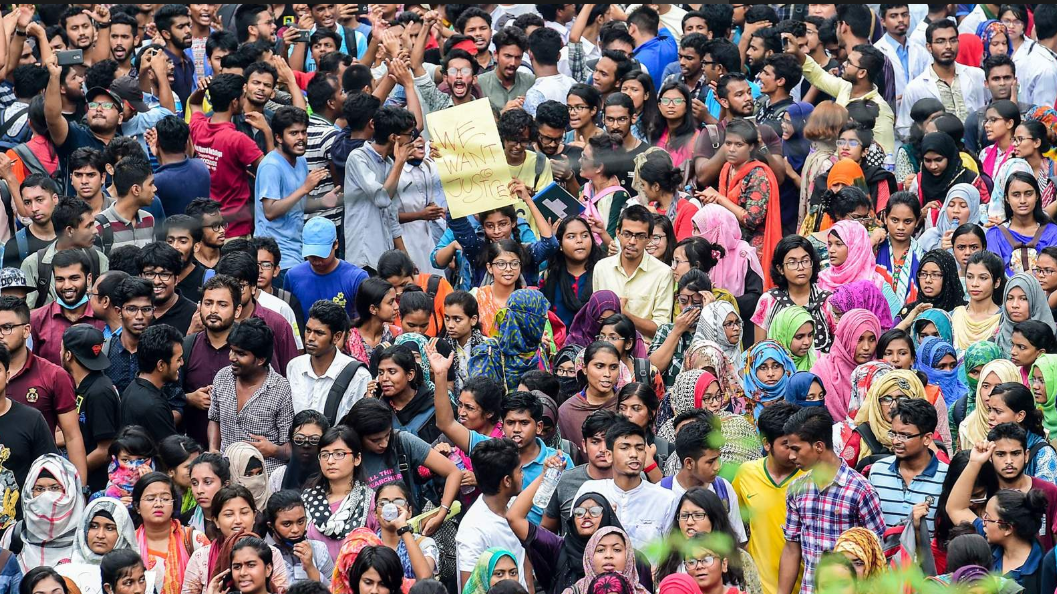ACTIVIST FACES 14 YEARS IN JAIL FOR MEDIA INTERVIEW
Shahidul Alam, photographer and outspoken social activist, has been charged under Section 57 of Bangladesh’s Information and Communication Technology Act after giving an interview to Al-Jazeera on the current wave of school student protests in Bangladesh. Detained and charged solely for exercising his right to freedom of expression, Shahidul Alam must be immediately and unconditionally released.
[su_row][su_column size=”1/2″ center=”no” class=””]
Shahidul Alam, a renowned Bangladeshi photographer and activist, has been charged for violating the draconian section 57(2) of Bangladesh’s Information and Communication Technology (Amendment) Act, 2013 (ICT). A lower court in Dhaka on 6 August 2018 also permitted the police to take him into remand for seven days. Police remands in Bangladesh are notorious for involving unlawful force leading to torture, other cruel or inhuman treatment and custodial death. When he appeared in court, Shahidul Alam was unable to walk, raising concerns that he may have been subject to torture or other ill-treatment while in custody.
Shahidul Alam was first detained on 5 August 2018, shortly after he was interviewed on the Al-Jazeera English news channel. Discussing the ongoing student protests in Bangladesh, which he had photographed and streamed on Facebook Live, he criticised the government’s heavy-handed response. Earlier that day, men in plainclothes wearing helmets and wielding machetes and iron bars attacked five photojournalists and journalists from local media who were also covering the largely peaceful protests.
Section 57 of the ICT Act carries a minimum sentence of seven years and a maximum of 14 years in jail. Falling short of international legal standards protecting the right to freedom of expression, the Act has been used to muzzle dissidents. Amnesty International considers Shahidul Alam a prisoner of conscience, detained for nothing but the legitimate use of his freedom of expression, and therefore calls for his immediate and unconditional release.
The charges against Shahidul Alam come against the backdrop of student protests calling for safer roads after two students were killed and 13 others injured by a speeding bus while they were waiting at a bus stop. The largely peaceful protests have been met by excessive police force, including the use of tear-gas and rubber bullets. More than two hundred students have been injured.
Please write immediately in English or Bangla or in your own language urging the authorities to:
- Immediately and unconditionally release Shahidul Alam, who is a prisoner of conscience, and drop all charges as he has been detained solely for peacefully exercising his human right to freedom of expression;
- Ensure that activists, human rights defenders, journalists, academics and members of the political opposition and other members of the public are able to peacefully exercise their rights to freedom of expression, freedom of peaceful assembly and freedom of association.
[/su_column]
[su_column size=”1/2″ center=”no” class=””]
Take action here!
Send an email here to the Minister of Home Affairs Asaduzzaman Khan Kamal and the Inspector General of Police of Bangladesh Mohammad Javed Patwary to release Shahidul and uphold freedom of expression.
PLEASE SEND APPEALS BEFORE 18 SEPTEMBER 2018
[gravityform id=”9″ title=”false” description=”false”]
[/su_column][/su_row]
Additional Information:
On 5 August 2018, Shahidul Alam was picked up by a group men in plainclothes from his residence in Dhanmondi, Dhaka after 10:00pm. According to security guards at the apartment building and other eyewitness reports, men who claimed to be from the Detective Branch (DB) went upstairs, brought him down and forcibly pushed him into a waiting car.
The men covered an existing CCTV camera with tape and took away the CCTV footage of their entry. The guards were manhandled and locked up. Shahidul Alam’s partner, who was in a neighbouring flat, raced downstairs on hearing his scream as he was taken away, but the car carrying him and two other cars waiting outside sped away.
The recent movements for road safety by the school and college students mostly aged below 18 have received widespread appreciation and solidarity from other citizens of Bangladesh. The initially peaceful movement by the students turned violent after men in plainclothes wearing helmets and wielding machetes and iron bars started attacking the children and journalists who were performing their professional duties by covering the incident.
Shahidul Alam and other individuals who have documented the attacks on Facebook and other social media platforms are now being tracked by security forces with the help of Bangladesh Chhatra League, the student front of the Awami League, the ruling political party in Bangladesh, and criminalized under the Information and Communications Technology (Amendment) Act, 2013.
The Bangladeshi government has not only failed to protect dissenting voices or hold accountable the vigilante groups that threaten them, it has also stifled freedom of expression through a slew of repressive tactics and new laws.
The ICT Act, which carries a minimum sentence of seven years, is seen as the principal instrument to muzzle critical voices in the country. Its vaguely worded clauses empower the authorities to prosecute people “in the interest of sovereignty, integrity or security of Bangladesh” or if they are deemed to “prejudice the image of the State” or “hurt religious belief”.
The government has used the draconian law to silence criticism in the media by bringing criminal charges against journalists for simply doing their work. In December 2016, Nazmul Huda, a print and television journalist, was arrested, viciously beaten in custody and then charged under the ICT Act for covering protests by garment workers outside the capital Dhaka.


